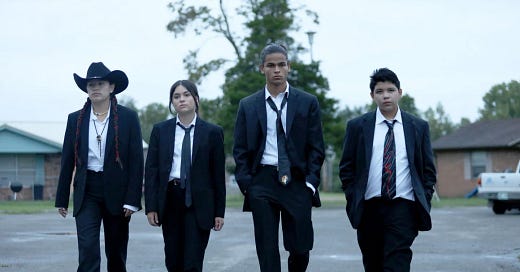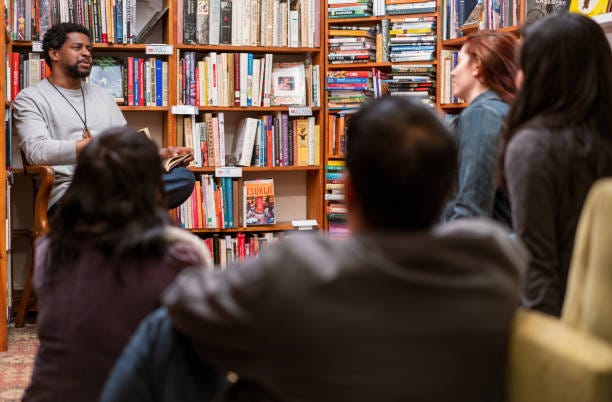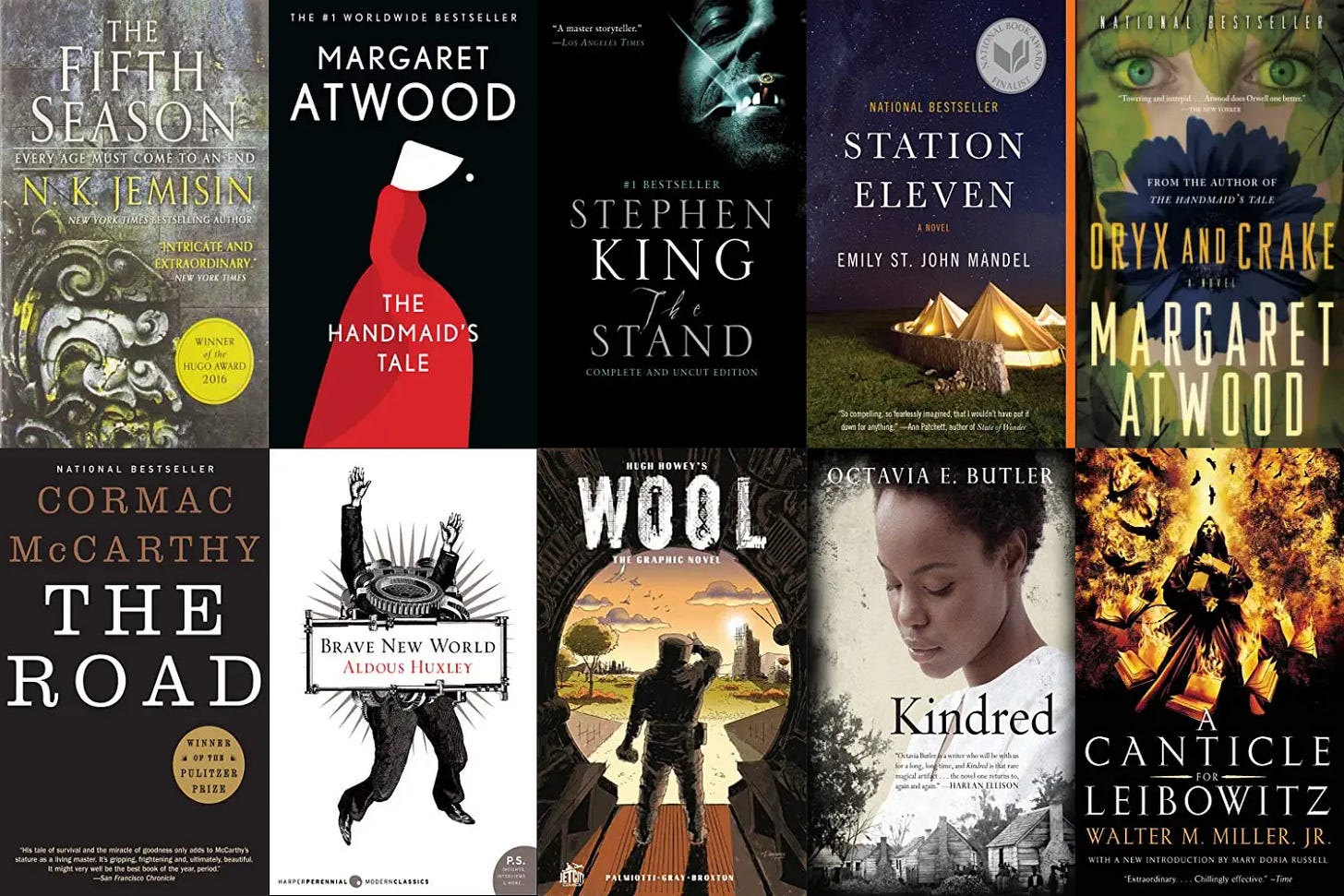IS YOUR BOOK CLUB MORE REVOLUTIONARY THAN YOUR PROTEST?
The algorithm wants you exhausted and alone. The revolution wants you in someone's kitchen. Guess which one wins?
SO I LASTED exactly two days back on social media before my body started doing that thing again. You know the thing — where your thumb develops its own consciousness and starts scrolling without your permission, where you wake up at 5am convinced you’ve missed something earth-shattering on Twitter, where your nervous system basically becomes a human notification center.
Two. Fucking. Days.
And I’m not alone in this. Studies show social media use increases anxiety and depression by up to 25%. Y’all, that’s a lot! It literally rewires our brains, hijacking our dopamine systems until we’re just rats hitting the lever for another hit of outrage. We’ve got an entire generation developing tech-induced ADHD, unable to focus for more than eight seconds because that’s how long a TikTok video trained them to pay attention.
But it’s not just our mental health that’s fucked — it’s our entire political discourse. Misinformation spreads six times faster than truth on these platforms. Six times! Foreign governments are using our feeds to manipulate elections, algorithms are amplifying the most extreme voices because rage equals engagement, and we’re so busy arguing with bots that we can’t organize against the actual fascists at our doorstep.
And here’s what’s really getting me: We’ve somehow convinced ourselves that awareness is activism. Like knowing about every single injustice, every moment of fuckery, every fresh hell served up by the algorithm is somehow . . . what? Helping? We’ve turned doom-scrolling into a moral imperative. “But I need to stay informed!” we tell ourselves, as if watching the world burn in real-time through a six-inch screen is the same as grabbing a bucket.
Look, I’m definitely not saying social media has zero value. It’s been INSTRUMENTAL in getting the truth out about Palestine when mainstream media won’t touch it. We’ve seen genocide in real-time because people on the ground could upload directly. In addition, Black Lives Matter organized through hashtags. #MeToo broke the silence.
Yet here’s also the problem — the same platforms that occasionally let truth slip through are actively suppressing Palestinian voices, shadow-banning Black and Brown accounts, and removing content that makes their advertisers nervous. They’ll let us see just enough horror to keep us scrolling, yet never enough to actually organize effectively against it.
So when I finally stopped opening those apps (again), something became blindingly obvious: We’re so busy consuming outrage that we’ve forgotten how to create change. We’re so deep in the forest of daily horrors that we can’t even see there IS a forest, let alone find our way out.
The real question that’s been eating at me is this: How do we fundamentally change the culture of a nation? Not just rebrand the apocalypse, but actually transform how Americans think about white supremacy, fascism, capitalism, patriarchy — all the greatest hits of systemic oppression. Because let me tell you, retweeting hot takes isn’t cutting it.
Here’s where I keep landing: Real change happens in living rooms, not algorithms. It happens when your “conservative” uncle actually sits down with you at Thanksgiving and has a conversation that doesn’t end with someone storming off (yes, this is painfully hard). It happens in book clubs where suburban moms suddenly realize that maybe, just maybe, the system isn’t *broken* — it’s working exactly as designed. It happens over glasses of wine in backyards where people feel safe enough to say, “I don’t understand this, help me understand.”
But here’s the thing — we’ve all but abandoned these spaces. We’ve retreated into our digital echo chambers where everyone already agrees with us, and we mistake likes for impact. Meanwhile, Mark Zuckerberg is literally buying Hawaii while we argue in his digital colosseum. The billionaire tech bros have us exactly where they want us: Isolated, anxious, and too exhausted from performing activism online to do the actual work offline.
Nothing says “late-stage capitalism” quite like thinking we can dismantle the master’s house with the master’s tools — especially when those tools are literally designed to keep us scrolling, not organizing.
And while we’re scrolling, we’ve somehow turned politicians into celebrities, hanging on their every viral moment like they’re dropping a new album instead of disappointing us with the same old shit. We wait for their direction, their permission, their grand plans — as if they’re our kings. But here’s the plot twist: We’re not their subjects. They’re ours. We’re the ones who decide what this culture looks like, what values we embrace, what future we build. Politicians? They’re just the boring-ass secretaries who are supposed to write down what we’ve already decided and make it official.
But instead, we’ve got people refreshing their feeds waiting for AOC’s latest clapback or Trump’s next unhinged rant like it’s actually going to change something. We’ve abdicated our power to create culture and handed it to people whose literal job is to respond to the culture we create. That’s not how any of this is supposed to work.
So what does real organizing look like in 2025?
Look, I don’t have all the answers, but I think in part it looks a lot like your neighbor’s kid teaching their grandparents about climate change over Sunday dinner. It looks like starting a “difficult conversations” group at your local library. It looks like those Muslim and Jewish families in my neighborhood who’ve been meeting monthly to figure out how to protect each other when the fascists come knocking.
This isn’t Kumbaya feel-good fuckery, as we hold hands and sing folk songs. It’s mapping escape routes and sharing lawyers’ numbers. It’s infrastructure building. It’s creating systems that work when the official ones fail us. It’s practical as fuck.
And here’s the sneaky part — sometimes the best political conversations aren’t “political” at all. Like, watch Succession with your boomer parents and suddenly you’re talking about wealth inequality without anyone getting defensive. Start a book club with The Fifth Season and watch people naturally start connecting systemic oppression to geological catastrophe (trust me, N.K. Jemisin knows what she’s doing). Hell, from what I have heard The Good Place may have done more to get Americans thinking about moral philosophy than any academic text ever could.
The trick is using stories as trojan horses for the conversations we desperately need to have. Speculative fiction, fantasy, and sci-fi especially — because when you’re talking about dragon hoarding or dystopian governments, people’s defenses come down. They stop protecting their political identity and start actually thinking. Stories give us the distance we need to see our own systems clearly. When we can explore privilege through the lens of who gets to wield magic and who doesn’t, suddenly we’re having revelations about redlining and educational access without anyone having to admit they were wrong about anything.
It looks like understanding that changing culture isn’t about winning arguments online — it’s about creating spaces where people can actually change their minds. And guess what? Nobody ever changed their mind because a stranger yelled at them on Facebook. But they might change their mind when someone they trust helps them connect the dots between their own struggles and systemic oppression.
Want to talk about capitalism without saying the C-word? Watch Reservation Dogs (image below) together and let the conversation flow naturally about who owns land and why. Need to discuss patriarchy without your uncle shutting down? Yellowjackets will get everyone debating whether women in crisis would *naturally* turn violent (spoiler: that assumption itself is the patriarchy talking). Even something like Everything Everywhere All at Once becomes a gateway to discussing generational trauma, immigrant experiences, and the weight of infinite possibilities under capitalism.
Books work even better. A book club isn’t “political organizing” — it’s just neighbors drinking wine and talking about stories. But read Parable of the Sower together and watch people start connecting climate change to their own growing anxieties. Read The Water Dancer and suddenly you're discussing memory, land, and what we owe our ancestors. Trail of Lightning opens up conversations about Indigenous relationships with land that no lecture ever could. The conversations that emerge from The Water Knife will do more to illustrate climate apartheid than any PowerPoint presentation ever could.
This isn’t just about the U.S., either. American cultural hegemony means our toxic discourse gets exported worldwide, like some kind of imperial anxiety disorder. When we’re too busy fighting each other online to organize effectively, it ripples out. When we model dysfunction, the world watches. But when we model actual community building, actual culture change? That ripples out too.
The work is slow. It’s uncomfortable. It doesn’t come with instant dopamine hits or viral moments. You can’t measure its impact in retweets. But it’s the only thing that’s ever actually worked. Every successful movement in history happened because people talked to each other face-to-face, built trust, created networks of care and resistance that no algorithm could infiltrate.
I don’t love what social media does to my nervous system or our collective sanity, yet I am staying on there. Because here’s the thing — these platforms can be incredible for finding your people, for disabled folks, for people who can’t leave their homes, for sharing mutual aid requests, for those moments of genuine human connection across distances. And yeah, awareness does matter. There are people who depend on social media voices to feel less alone in this hellscape. That is important and I personally do not want to abandon anyone.
But I’m done treating these platforms like they’re our saviors. We’re putting all our eggs in two broken baskets: social media and politicians. Both systems are rigged as fuck. Both are designed to keep us feeling powerless while maintaining the illusion of participation. Zuckerberg and Musk aren’t rebels — they’re the establishment wearing hoodies instead of suits. These platforms might let us cosplay at revolution, but they’re owned by the very people we’re supposedly revolting against.
So here’s how I’m using them: I post. I share. I signal-boost mutual aid and Palestinian voices and whatever else needs amplifying. But I refuse to confuse that with the additional work. I refuse to let the algorithm convince me that tweeting is the same as building.
The real work, for me — the work of fundamentally transforming culture — happens when I close the socials and show up how I can. Awkwardly. Imperfectly. Repeatedly.
So, fellow peasants, time to get uncomfortable in some living rooms. The revolution will not be tweeted — but it might just happen over coffee in your kitchen. Or over a book. Or during the credits of a show that just blew your mind. Because that’s how culture actually changes — one story, one conversation, one “holy shit I never thought about it that way” moment at a time.
Your next *holy shit moment* is waiting in someone else’s living room. Go find it.








Yes- social media can drain you so much that you feel like you've really put in some effort when all you've done is scroll and re-post. I'd like to add Andor (fascism/imperialism) and Severance (capitalism) to your great list!
Wow- this is so good, Jo! Such a great point about how stories/fiction allow us distance from the real world while also giving a new perspective on it.